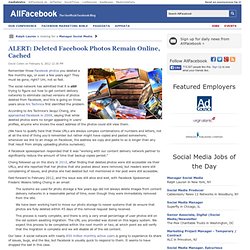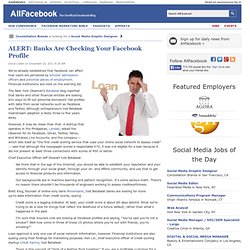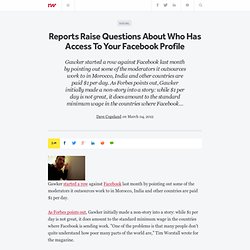

Facebook Lays Out All Of Its New Targeting Techniques In One Easy-To-Read Blog Post. What Employers Are Thinking When They Look At Your Facebook Page. ALERT: Deleted Facebook Photos Remain Online, Cached. Remember those Facebook photos you deleted a few months ago, or even a few years ago?

They must be gone, right? Um, not so fast. The social network has admitted that it is still trying to figure out how to get content delivery networks to eliminate cached versions of photos deleted from Facebook, and this is going on three years since Ars Technica first identified the problem. According to Ars Technica’s Jacqui Cheng, she approached Facebook in 2009, saying that while deleted photos were no longer appearing in users’ profiles, anyone who knows the exact address of the photos could still view them. (We have to qualify here that these URLs are always complex combinations of numbers and letters, not at all the kind of thing you’d remember but rather might have copied and pasted somewhere; whenever we link to an image on Facebook, the address we copy and paste to so is longer than any that result from simply uploading photos ourselves). ALERT: Banks Are Checking Your Facebook Profile. We’ve already established that Facebook can affect how users are perceived by schools’ admissions officers and potential places of employment.

Financial institutions are next on the warning list. The New York Observer‘s Betabeat blog reported that banks and other financial entities are looking into ways to fill out potential borrowers’ risk profiles with data from social networks such as Facebook and Twitter, although entrepreneurs told Betabeat mainstream adoption is likely three to five years away. However, it may be closer than that. A startup that operates in the Philippines, Lenddo, asked the Observer for its Facebook, Gmail, Twitter, Yahoo, and Windows Live Accounts, and the company — which bills itself as “the first credit scoring service that uses your online social network to assess credit” — said that although the newspaper scored a respectable 470, it was not eligible for a loan because it did not present at least three connections with scores of 400 or better. How Facebook Tracks Its Users. For the first time, Facebook has revealed details about how it tracks users across the web.
Through interviews with Facebook engineering director Arturo Bejar, Facebook spokesman Andrew Noyes, Facebook corporate spokesman Barry Schnitt and Facebook engineering manager Gregg Stefancik, USA Today's Byron Acohido was able to compile the most complete picture to date of how the social network keeps tabs on its 800 million users. Here is what Acohido learned: Facebook doesn't track everybody the same way. It uses different methods for members who have signed in and are using their accounts, members who are logged-off and non-members.The first time you arrive at any Facebook.com page, the company inserts cookies in your browser. Reports Raise Questions About Who Has Access To Your Facebook Profile. Gawker started a row against Facebook last month by pointing out some of the moderators it outsources work to in Morocco, India and other countries are paid $1 per day.

As Forbes points out, Gawker initially made a non-story into a story: while $1 per day is not great, it does amount to the standard minimum wage in the countries where Facebook is sending work. "One of the problems is that many people don't quite understand how poor many parts of the world are," Tim Worstall wrote for the magazine. The bigger problem for Facebook users, as noted by the Independent, may be what information those moderators can access. The moderators are charged with dealing with user complaints about content: everything from the use of copyrighted material without permission to offensive images or other content that violates Facebook's user agreements.
That, according to the Independent, is not true. Creepy?